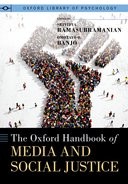 The Oxford Handbook of Media and Social Justice
The Oxford Handbook of Media and Social Justice
Contents
-
-
-
-
-
-
-
-
-
-
-
Act 1: Defining Activism, Committing to Social Justice, and Centering Black Humanity Act 1: Defining Activism, Committing to Social Justice, and Centering Black Humanity
-
Act 2: Methods for Finessing Boundaries Act 2: Methods for Finessing Boundaries
-
Act 3: Affirming Blackness in Media and Academia Act 3: Affirming Blackness in Media and Academia
-
Conclusion: Black
ActivismJoy in the Everyday Conclusion: BlackActivismJoy in the Everyday -
References References
-
-
-
-
-
-
-
-
-
-
-
-
-
-
-
6 “How Do You Shift That?” Dialoguing Social Justice, Activism, and Black Joy in Media Studies
Get accessjas l. moultrie is a storyholder, filmmaker, and doctoral candidate studying communication at the University of Washington, Seattle. Her interests include Blackness, madness, performance, memory, and creative nonfiction. While making space for her selves within the academy, she is building a literacy project for and by Black young people to amplify joy, well-being, and encourage healing.
Ralina L. Joseph is a scholar, teacher, and facilitator of race and communication. She is Presidential Term Professor of Communication; Founding Director of the Center for Communication, Difference, and Equity; and Associate Dean of Equity & Justice in the Graduate School at the University of Washington. She is the author of three books on race and communication and is currently writing Interrupting Privilege: Radical Listening, Talking Race, and Fighting Racism, a book of essays based on her public scholarship.
-
Published:19 September 2024
Cite
Abstract
In this chapter we lovingly center Blackness as the space from which Black media studies scholars study, create, teach, and affect media. Through the practice of radical listening, the chapter spotlights dialogues between foundational, cross-genre, and genre-defying scholars in Black media and communication: Herman Gray and Jane Rhodes; John L. Jackson, Jr., and E. Patrick Johnson; Andre Brock and Kishonna Gray; and Robin R. Means Coleman and Beretta E. Smith-Shomade. Our conversations—on defining activism, committing to social justice, engaging methods for finessing boundaries, and unsettling anti-Blackness in media and academia—begin and end with Rhodes’ guiding question, “How do you shift that?” This chapter celebrates such a shift, of Black media studies scholars embodying joyful paths for justice and knowledge. We conclude with reimagining Black media studies as refusing to define, in the words of the late filmmaker Marlon Riggs’s last documentary, what “Black is … [and] Black ain’t.”
Sign in
Personal account
- Sign in with email/username & password
- Get email alerts
- Save searches
- Purchase content
- Activate your purchase/trial code
- Add your ORCID iD
Purchase
Our books are available by subscription or purchase to libraries and institutions.
Purchasing information| Month: | Total Views: |
|---|---|
| September 2024 | 5 |
| October 2024 | 17 |
| November 2024 | 2 |
| December 2024 | 6 |
| January 2025 | 6 |
| February 2025 | 3 |
| March 2025 | 1 |
| April 2025 | 3 |
| May 2025 | 1 |
Get help with access
Institutional access
Access to content on Oxford Academic is often provided through institutional subscriptions and purchases. If you are a member of an institution with an active account, you may be able to access content in one of the following ways:
IP based access
Typically, access is provided across an institutional network to a range of IP addresses. This authentication occurs automatically, and it is not possible to sign out of an IP authenticated account.
Sign in through your institution
Choose this option to get remote access when outside your institution. Shibboleth/Open Athens technology is used to provide single sign-on between your institution’s website and Oxford Academic.
If your institution is not listed or you cannot sign in to your institution’s website, please contact your librarian or administrator.
Sign in with a library card
Enter your library card number to sign in. If you cannot sign in, please contact your librarian.
Society Members
Society member access to a journal is achieved in one of the following ways:
Sign in through society site
Many societies offer single sign-on between the society website and Oxford Academic. If you see ‘Sign in through society site’ in the sign in pane within a journal:
If you do not have a society account or have forgotten your username or password, please contact your society.
Sign in using a personal account
Some societies use Oxford Academic personal accounts to provide access to their members. See below.
Personal account
A personal account can be used to get email alerts, save searches, purchase content, and activate subscriptions.
Some societies use Oxford Academic personal accounts to provide access to their members.
Viewing your signed in accounts
Click the account icon in the top right to:
Signed in but can't access content
Oxford Academic is home to a wide variety of products. The institutional subscription may not cover the content that you are trying to access. If you believe you should have access to that content, please contact your librarian.
Institutional account management
For librarians and administrators, your personal account also provides access to institutional account management. Here you will find options to view and activate subscriptions, manage institutional settings and access options, access usage statistics, and more.